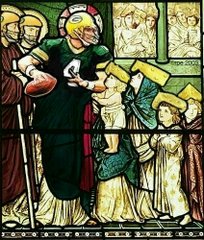 On October 31, 1517, the Rev. Dr. Martinus Luther nailed 95 Theses to the doors of the Wittenberg Church to initiate debate regarding the indulgences being marketed at the order of the pope by a German Dominican friar named Johann Tetzel. The selling of those indulgences distressed Luther because he saw it as misinforming lay people about crucial aspects of God’s plan for redeeming sinners and giving them eternal life.
On October 31, 1517, the Rev. Dr. Martinus Luther nailed 95 Theses to the doors of the Wittenberg Church to initiate debate regarding the indulgences being marketed at the order of the pope by a German Dominican friar named Johann Tetzel. The selling of those indulgences distressed Luther because he saw it as misinforming lay people about crucial aspects of God’s plan for redeeming sinners and giving them eternal life.Yet, contrary to the popular belief and practice of the Lutheran Church since coming to the shores of the Americas, the Reformation was most definitely not about jettisoning all things “Catholic.” In fact, according to Article XI of The Augsburg Confession, “Our churches teach that private Absolution should be retained in the churches, although listing all sins is not necessary for Confession. For, according to the Psalm, ‘Who can discern his errors?’ (Psalm 19:12)”
Furthermore, in his Large Catechism Exhortation to Confession, Dr. Luther goes so far as to instruct the pastors, preachers, and heads of household tasked with the teaching of the One True Faith: “When I urge you to go to Confession, I am doing nothing else than urging you to be a Christian. If I have brought you to the point of being a Christian, I have thereby also brought you to Confession.
This should really come as no surprise to Lutherans, though such is too often the case. Because the Reformation began with these words from Thesis 1 of the 95:
“Our Lord and Master Jesus Christ, when He said [‘Do penance.’], willed that the whole life of believers should be repentance.”
After all, this is what our Baptism is all about as we have learned and confessed in our Catechism training:
What does such baptizing with water signify? It signifies that the old Adam in us should, by daily contrition and repentance, be drowned and die with all sins and evil lusts, and, again, a new man daily come forth and arise; who shall live before God in righteousness and purity forever.
Where is this written? St. Paul says Romans, chapter 6: We are buried with Christ by Baptism into death, that, like as He was raised up from the dead by the glory of the Father, even so we also should walk in newness of life.
Truly, “When [your pastor teaches and preaches] you to go to Confession, he is doing nothing else than urging you to be a Christian.” For in confessing your sins and receiving the absolution of our Lord, your personal relationship with Jesus is established and maintained by the power of the Holy Spirit according to the Father’s will.
And that, dear Baptized, is the kingdom of heaven come to earth for you!
God bless us as we continue the Lutheran Reformation in the 21st Century--and grant that we may ever remain not only the church of our grandfathers, but also the church of Luther and the litany of church fathers that stretches all the way back to Abraham, and even Adam; and gathers with us at the altar whenever we celebrate the Divine Service.






No comments:
Post a Comment